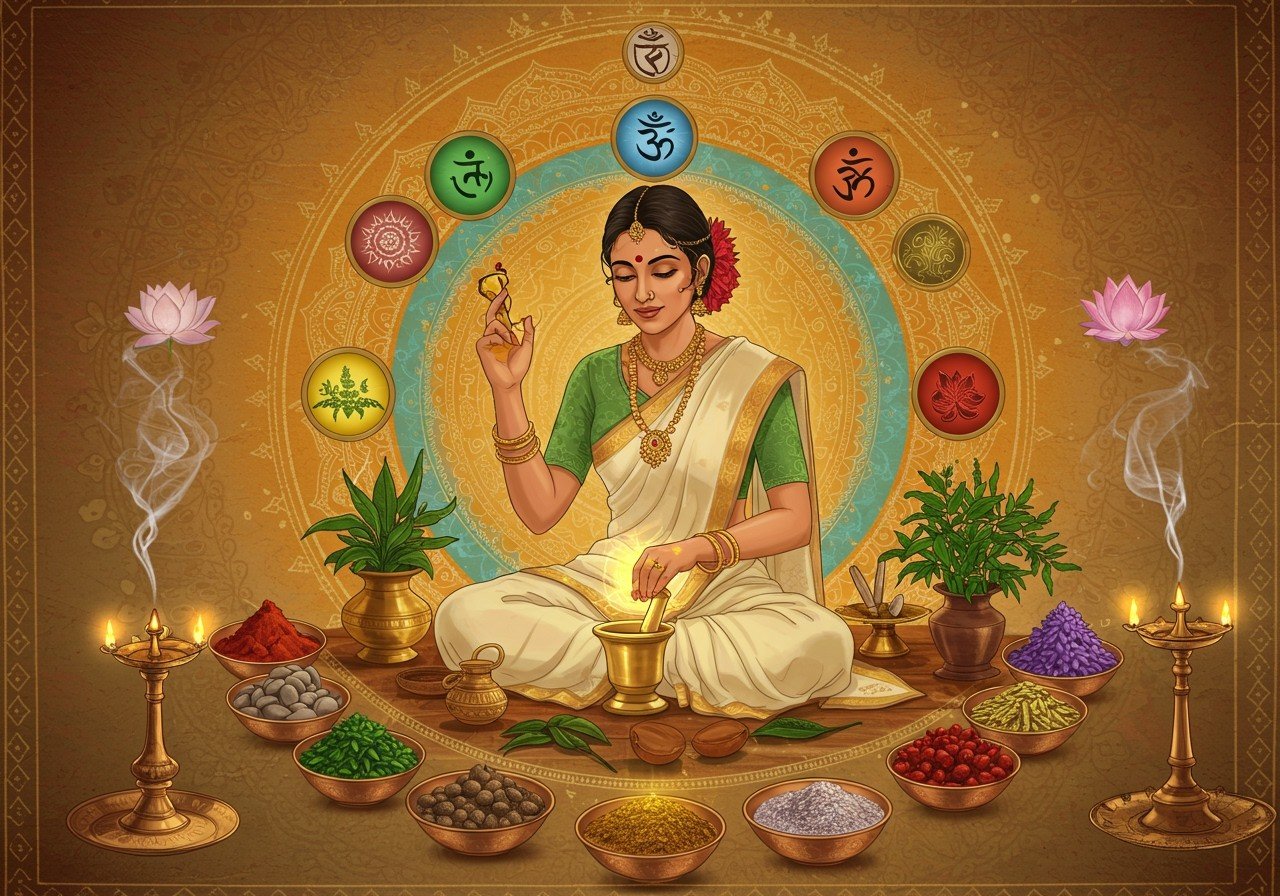
Ayurveda, the ancient science of life, originating in India over 3,000 years ago, has been a cornerstone of traditional Indian medicine for millennia. This blog post explores Ayurveda as an Upaveda, a supporting branch of the Vedas, and its profound impact on health and wellbeing. We’ll delve into its origins, its connection to the Vedas, and how it remains incredibly relevant in our modern lives, offering solutions for a balanced lifestyle amidst today’s challenges.
Understanding Upaveda
An Upaveda is a supplementary or supporting body of knowledge attached to the main Vedic texts. These hold immense importance in the Indian knowledge system, complementing the primary Vedas. Ayurveda is recognized as an Upaveda, with its core principles stemming from the Atharva Veda. It shares connections with other Upavedas like Dhanurveda (the science of warfare) and Gandharvaveda (the science of music), showcasing the holistic nature of Vedic sciences. Each Upaveda contributes a unique dimension, enriching the fundamental Vedic teachings.
Ayurveda’s classification as an Upaveda highlights its significant role in fostering health and longevity. It beautifully integrates the physical, mental, and spiritual aspects of wellbeing, aiming for a balanced and harmonious life. Understanding this classification allows us to appreciate Ayurveda’s place within the broader Vedic framework and its deep cultural significance in India.
Ayurveda and the Atharva Veda
Ayurveda, as a complete wellness system, traces its origins back to the ancient Atharva Veda. This sacred text, one of the four Vedas, is a treasure trove of wisdom on healing and health. It offers valuable insights into herbal medicines, rituals, and practices that nourish both our physical bodies and spiritual selves. The hymns of the Atharva Veda reveal a profound understanding of nature’s healing power, forming the very foundation of Ayurveda’s holistic philosophy.
Core Principles of Ayurveda
At the heart of Ayurveda lie the Tridoshas – Vata, Pitta, and Kapha. These vital energies govern our bodily functions, and maintaining their equilibrium is the key to good health. Alongside this, the Panchamahabhuta theory explains how the five great elements – earth, water, fire, air, and ether – shape our physical and mental states. Ayurveda stresses the importance of understanding one’s Prakriti, our unique individual constitution, so treatments can be personalized for the most effective care.
Ayurveda’s Approach to Health and Wellbeing
Ayurveda truly shines in the realm of preventive healthcare. It encourages lifestyle adjustments through daily routines (Dinacharya) and seasonal regimens (Ritucharya) to keep us vibrant and healthy throughout the year. Herbal medicines and therapies like Panchakarma assist in detoxification, purifying the body from within. Practices such as yoga and meditation cultivate mental equilibrium, fostering inner peace and emotional resilience in the face of life’s challenges.
Ayurveda recognizes the profound connection between our inner world and outer radiance. By nurturing inner balance, we can enhance our natural beauty and energy. Rejuvenating therapies and herbal oils, combined with a holistic lifestyle, work together to nourish the skin, reduce signs of aging, and promote sustained vitality. This approach supports us in embracing our natural beauty and enjoying lasting energy through self-care, balanced living, and proper rest.
Modern Relevance of Ayurveda
In today’s world, Ayurveda is experiencing a resurgence of interest, thanks to its natural and holistic methods. It seamlessly integrates with modern wellness practices, influencing our skincare routines, dietary habits, and overall approach to health. Globally recognized as a complementary medicine, Ayurveda offers solutions to contemporary issues like stress, anxiety, and chronic diseases. While challenges remain, its evidence-based practices continue to demonstrate their effectiveness, backed by both ancient wisdom and modern research.
For those interested in experiencing the benefits of Ayurveda firsthand, explore our comprehensive guide on Ayurveda and Spirituality. It provides a deeper understanding of this holistic system and its potential to enhance your overall well-being.
How Poojn Supports Your Ayurvedic Journey
At Poojn.in, we offer authentic Ayurvedic ingredients and supplies to support your wellness journey. Our carefully curated selection includes essential items for your Ayurvedic practices.
Essential Ayurvedic Ingredients:
- Haritaki (Terminalia Chebula): Available in a range of quantities (100g to 900g), Haritaki is a staple in traditional Ayurvedic preparations, known for its various health benefits. It’s a versatile ingredient supporting overall well-being.
- Kala Til (Black Sesame): Pure black sesame seeds are available in multiple pack sizes (25g to 1kg) for both ritual use and to enhance your wellness practices. These nutritious seeds are a valuable addition to an Ayurvedic lifestyle.
- Supari (Areca Nut): We offer premium quality Supari in different quantities (50g to 900g) to meet your specific needs. It is important to use Supari responsibly and in moderation as part of traditional practices.
All our products are ethically sourced from trusted suppliers and undergo rigorous quality checks to guarantee purity and authenticity. We provide detailed product information and usage guidelines with every purchase, empowering you to make informed choices. Find high quality cotton threads for your pooja needs here and here.
Why Choose Poojn for Ayurvedic Supplies?
- Genuine Products: We offer authentic Ayurvedic products with clearly defined quantity options to suit your requirements.
- Convenient Online Ordering: Enjoy a hassle-free shopping experience with our user-friendly online platform.
- Direct Delivery: We deliver right to your doorstep, saving you time and effort.
- Expert Guidance: Receive personalized assistance with product selection and Ayurvedic practices.
For personalized support with Ayurvedic products, reach out to our knowledgeable team:
- Call: 03369029784
- WhatsApp: 9476142738
Visit poojn.in to discover our complete range of Ayurvedic ingredients and supplies.
Embracing Ayurveda in Our Daily Lives
The wisdom of Ayurveda provides valuable guidance in today’s busy world. It encourages us to live in harmony with nature and pay close attention to our body’s unique needs. By embracing its core principles, we can cultivate a fulfilling lifestyle that promotes both physical health and inner happiness. Whether through practicing mindful eating, incorporating yoga into our routine, or utilizing time-tested herbal remedies, Ayurveda offers practical tools for navigating everyday life. As we honor this rich, ancient tradition, we discover a balanced path to well-being that respects both our heritage and our modern needs. Let’s welcome Ayurveda into our lives, nourishing ourselves and generations to come with its timeless teachings.
For further exploration into the world of holistic wellness, discover how Yoga and Ayurveda complement each other to create a harmonious balance in your life. And for those seeking to deepen their spiritual practice, learn more about the transformative power of Mantra Chanting.
Ayurveda FAQs: Your Questions Answered
What is Ayurveda? Ayurveda, originating in India over 3,000 years ago, is a traditional holistic medical system. It focuses on harmonizing mind, body, and spirit for overall well-being, emphasizing personalized care and natural remedies.
Which Veda is Ayurveda an Upaveda of? Ayurveda is considered the Upaveda of the Atharva Veda, drawing its wisdom from this ancient text focused on healing, health, and well-being.
Why is Ayurveda called an Upaveda? Ayurveda is termed an Upaveda as it’s a supplementary body of knowledge branching from the Vedas, specifically expanding upon health and medicine, enriching Vedic teachings with practical applications.
How does Ayurveda relate to life and wellbeing? Ayurveda promotes balanced living through natural methods like diet, herbal remedies, and lifestyle adjustments, aligning with the rhythms of nature to enhance overall well-being.
Is Ayurveda connected to any other Upavedas? Yes, Ayurveda often complements other Upavedas such as Gandharva Veda (music) and Dhanurveda (martial arts) to promote holistic well-being, integrating physical and mental wellness with other aspects of life.
What are the key principles of Ayurveda? Ayurveda centers around balancing the three doshas—Vata, Pitta, and Kapha—which represent vital energies. It emphasizes tailored diet, sufficient sleep, and harmonious lifestyle as pillars of good health. You can also find detailed information in this post: Ayurveda and Spirituality: A Holistic Wellness Guide.
How does Ayurveda fit into the Indian knowledge system? Ayurveda is woven into the fabric of Indian tradition, providing time-tested insights into health. Widely practiced, it offers both preventive and curative benefits, contributing to the holistic approach of the Indian knowledge system.


